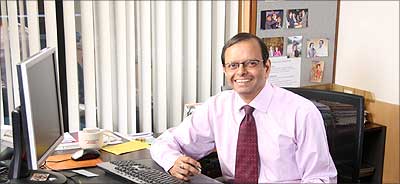|
|
| Help | |
| You are here: Rediff Home » India » Business » Pix |
|
 It will be a momentous occasion when on June 27, 2008, IT czar Bill Gates steps down as the Microsoft boss to pursue philanthropy full time.
It will be a momentous occasion when on June 27, 2008, IT czar Bill Gates steps down as the Microsoft boss to pursue philanthropy full time.
So what was Bill Gates legacy like, and how will Microsoft cope with the challenges that the future will toss up? What made Gates one of the world's most successful entrepreneurs ever?
In an interview with Senior Associate Editor Indrani Roy Mitra, National Association of Software & Services Companies Chairman for 2008-2009, Dr Ganesh Natarajan spoke about Bill Gates, Microsoft's past, present and future, and also about what made Gates a great businessman.
Natarajan has been the CEO of IT company Zensar for over seven years. He is an alumnus of IIT Bombay and the Harvard Business School.
He was named 'CEO of the Year' by the Asia Pacific HR Conference in 1999 and received the Asia HRD Congress Award for Contributions to the Organisation through HR in 2005.
Natarajan was also the finalist at the Ernst & Young 2005 Award where he was recognised for his entrepreneurship.
He chairs the Outsourcing Forum of the Confederation of Indian Industries in Western India and is part of the CII Western Region Council. Excerpts from the interview:
Bill Gates will step down as the Microsoft boss soon to pursue philanthropy full time. An era is coming to an end. Please share with us your thoughts on this.
There is an old saying, 'The king is dead, long live the king�' Gates' stepping down is truly the end of an era, but (Microsoft chief executive) Steve Ballmer has been adequately prepared to take over Gates' role.
Microsoft today is an organisation that is not personality-dependent.
Gates has anchored Micosoft during its turbulent times like a true master. What do you think has been his strength?
Gates has been a true clairvoyant, evangelist and orator (CEO) and has had the vision to not only dream impossible dreams, but back them up with money and robust implementation.
It is he who made Microsoft the 800-pound gorilla of software business.
Clarity of purpose and relentless pursuit of goals have been his strengths.
Do you think Microsoft will be able to retain its position in the post-Bill Gates period?
Yes it will be, despite the fact that competitors like IBM, Sun and Apple will always challenge the company's dominance in the software and entertainment space.
Is Steve Ballmer, according to you, the fittest person to carry on the Gates' legacy?
Yes he is. Ballmer is a great leader.
The transition at Microsoft will be as successful as it was in Nasscom when Kiran Karnik, a man of totally different style, effectively took over the unfinished tasks of Dewang Mehta.
What is your opinion about Gates, the philanthropist?
Gates has already done great work in many parts of the world and has brought to philanthropy the same focus and managerial skills that enabled him to succeed in business. He has in him the potential to make the world a better place to live in.
Has there been any point in the Microsoft history when you felt Gates had erred? If so, when and why?
Sure. Microsoft did miss the Internet bus to a certain extent and now it has arrived a little late in the entertainment business.
The company's strategy in China also misfired in the early days. But importantly, the company has learnt from its mistakes. It is now adapting itself and pushing for market shares and opportunities in key business areas and geographies.
What, according to you, have been the reasons for Microsoft's success in the IT world?
The company chose a space and knew how to dominate it. Its incredible marketing muscle pushed many competitors like Lotus and Netscape out of the way. It is Microsoft that has effectively demonstrated that scale is everything in the global landscape.
What do you feel Microsoft should do to retain its position as the global IT major?
The company should start adapting to changing times and make big investments on services oriented architecture and also in software as a service.
Its best bet will be to make its current model obsolete by building new product suites before competitors force it to get out of the way.
|
|
| © 2008 Rediff.com India Limited. All Rights Reserved. Disclaimer | Feedback |